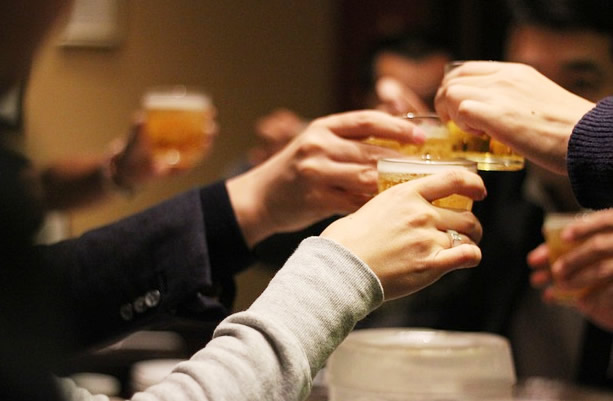先日から「The drinking culture hidden inside Japan’s liquor stores -「日本の酒屋に隠れた飲酒文化」を読んでいます。

・「日本の酒屋に隠れた飲酒文化」(1)
・「日本の酒屋に隠れた飲酒文化」(2)
・「日本の酒屋に隠れた飲酒文化」(3)
・「日本の酒屋に隠れた飲酒文化」(4)
Many kaku-uchi are also aiming to attract a young clientele.
また多くの角打ちは、若い客層の取り込みを狙っている。
Akiyasu Seki is the owner of Tokyo kaku-uchi Futaba and president of the Tokyo Liquor Retailers Association’s youth branch.
東京の「角打ちフタバ」店主であり、東京都酒販組合青年部会長でもある関明泰氏。
The organisation, which unites 2,300 liquor shops, promotes sake culture and responsible drinking among young people;
2,300の酒販店を束ねる同団体は、日本酒文化の普及と若者の責任ある飲酒を推進しており、
and in 2018 it launched the Liquor Store Kaku-uchi Festival, with one of its latest editions attracting 30,000 participants.
2018年には「酒販店角打ち祭り」を立ち上げ、最新のそれでは3万人が参加した。
Held in Tokyo twice a year, dozens of the city’s liquor shops have stalls for people to taste their products while enjoying food and live music.
年に2回、東京で開催され、都内の酒販店数十店舗が出店し、食事やライブを楽しみながら酒を味わうことが出来る。
Seki explained that kaku-uchi used to be popular in Tokyo but practically disappeared in the late 1990s and early 2000s when hygiene regulations were tightened, obliging liquor shops to register as restaurants to serve food and drinks.
関氏は「かつて東京では角打ちが盛んでしたが、1990年代後半から2000年代前半にかけて衛生規制が強化されると、酒屋が飲食店としての登録を義務づけられ、実質的に姿を消しました」と説明する。
Now, however, they’re experiencing a revival.
しかし今、復活の時を迎えている。
“Historically, liquor shops are places where people exchange information about the neighbourhood and, in Tokyo, kaku-uchi are increasingly becoming part of the fabric of the community,” he said.
「歴史的に酒屋は近隣の情報を交換する場所であり、東京では、角打ちはますますコミュニティの一部となりつつあります。」
fabric「布、織物、織り方、生地、(教会などの)建物の外部、構造、組織」。
東京では衛生規制が厳しくなって、一時、角打ちは廃れたという話。
人口も多い大都市なので、仕方ないことでしょうけども、少し窮屈さを感じてしまいました。
しかしこのきっちりしたシステムが、清潔な大都市東京を作り上げているとも言えるんでしょうね。
理由は単純明快!「少ないコストでしっかり楽しく学べるから」。
私自身の経験(高機能でビックリ)をびっしり書いていますので、良かったら読んでみてください。
下のバナーからどうぞ!






